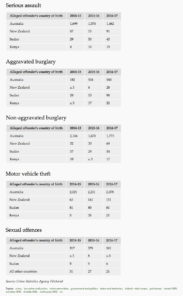African Gangs in Melbourne Are a Problem, Police Admit, As Victorian Government Defends Strategy
Brad Ryan and Guy Stayner, Australian Broadcasting Company, January 2, 2018
Victorian police have conceded Melbourne has a problem with African street gangs, after earlier insisting there were no gangs in the city, as the State Government rejects criticism it has dropped the ball on the problem.
Police Minister Lisa Neville on Tuesday defended the Government’s handling of youth crime after the Federal Government on Monday said “African gang crime” was out of control in Melbourne because of lenient state policies.
The issue has become a priority for both major parties after a series of recent headline-grabbing crimes blamed on groups of young African men, including the trashing of an Airbnb property in Werribee, vandalism in Tarneit and a night of violence at St Kilda Beach involving dozens of youths.
Just days after Victoria Police Deputy Commissioner Andrew Crisp said he did “not accept for a minute that we do have gangs”, Acting Chief Commissioner Shane Patton said there were African street gangs in Melbourne.
“We have for a significant period of time said that there is an issue with overrepresentation by African youth in serious and violent offending as well as public disorder issues,” Acting Commissioner Patton said.
“These young thugs, these young criminals, they’re not an organised crime group like a Middle Eastern organised crime group or an outlaw motorcycle gang. But they’re behaving like street gangs, so let’s call them that — that’s what they are.”
Ms Neville said most African migrants were law-abiding citizens, but “this core group of African youths are causing huge fear”.
She said Victoria Police noticed youth offending “go to a new level” in 2016, and the State Government responded by:
“These resource are having an impact,” Ms Neville said.
“We have seen substantial breaking up of a number of the networked youth offenders in other parts of the state.
“We’ve seen the biggest decrease in the crime rate in over a decade.”
Ms Neville said upcoming changes to the Youth Parole Board meant police would be informed when young people were paroled, and conditions would be placed on parolees to prevent reoffending.
A program that started in November was also targeting repeat offenders with intensive, individual case management, she said.
On Monday, Prime Minister Malcolm Turnbull said the Government was concerned about “growing gang violence and lawlessness” in Melbourne, and frontbencher Greg Hunt said “African gang crime in some areas in particular is clearly out of control”.
With a state election less than a year away, the federal Coalition is pushing the merits of its Victorian counterparts’ law-and-order policy, including a pledge to introduce mandatory sentencing for repeat offenders behind crimes such as home invasions, armed robberies and aggravated car-jackings.
Sudanese youth mentor Nelly Yoa is also critical of the State Government.
“The punishments are not harsh enough. The Victorian Government has been so lenient on youth offending,” he told ABC News.
“We need to start from a grassroots level. Community engagement with these youths is paramount.”
But another Sudanese community leader, Richard Deng, said the Prime Minister should be more supportive of the State Government’s efforts.
“[The] African community shouldn’t be used as a political tool to win [an] election,” he said.
Ahmed Hassan, the director of an organisation that helps marginalised young people, said the proportion of African youths involved in crime was a small minority.
“We seemingly don’t have an African gang problem — what we do have is young people who are disadvantaged, who are disengaged, a young cohort who are coming together that are causing this mischievous activity,” said Mr Hassan, who runs the Youth Activating Youth program.
Shadow attorney-general John Pesutto said the Government should drop Youth Control Orders — a sentencing option requiring young offenders to take part in education or work and comply with conditions such as curfews.
“Now is not the time to be introducing measures from Daniel Andrews that will make it easier … for violent offenders to remain out on the street,” he said.
Data from Victoria’s Crime Statistics Agency, below, shows an overrepresentation of Sudanese-born and Kenyan-born offenders in some crime categories, proportional to their Victorian populations.
They also show a sharp rise in Sudanese-born offenders involved in armed robberies, from 20 in the 2014-15 financial year to 98 two years later.
However, the statistics also show that a Victorian is more than 25 times more likely to be seriously assaulted by someone born in Australia or New Zealand than someone born in Sudan or Kenya.
They are almost five times more likely to be the victim of an aggravated burglary committed by an Australian or New Zealand-born offender, than one born in Sudan or Kenya.
According to Census figures, people born in Sudan make up about 0.1 per cent of Victoria’s population. The Kenyan-born population in Victoria is about the half the size of the Sudanese-born population.
















